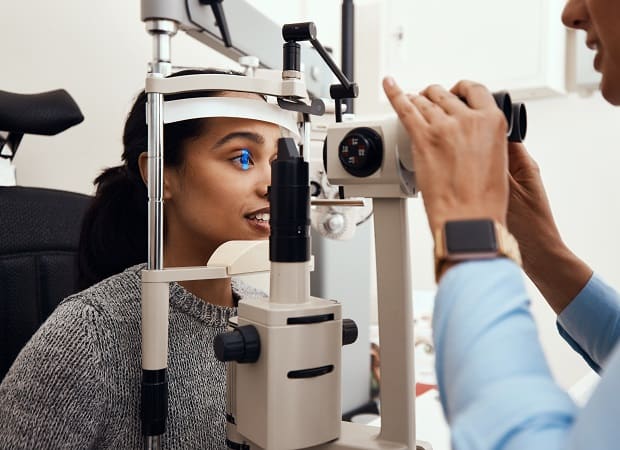
Farsightedness Treatment
For St. Petersburg & Clearwater, FL
Farsightedness, or hyperopia, is a common vision condition that often presents in childhood. People who are farsighted can see objects in the distance clearly, but your eyesight blurs as you get closer. Blurry near vision can be corrected with prescription eyeglasses, contact lenses or laser vision correction, and our Ophthalmologists can help you determine the best way to improve your eyesight.
Hyperopia is a type of refractive error caused by a misshapen cornea. The cornea is the transparent layer at the front of your eye that works together with the lens to bend (or refract) light onto the tissue lining the back of your eye (retina). If the cornea does not have a smooth, round shape like a marble, the light rays are not focused correctly, leading to refractive errors, including farsightedness, nearsightedness and astigmatism. Farsightedness occurs when the shape of the cornea is flat and shorter than usual.

Farsightedness Symptoms
People with a family history of refractive errors such as farsightedness are more likely to develop them. Sometimes the blurry near vision is present at birth but may not be diagnosed until the child is older and in school, depending on the degree of hyperopia. Farsightedness affects 5-10% of Americans, and the most common symptoms include:
- Nearby objects appear blurry
- Squinting to view things clearly
- Eyestrain
- Burning eyes
- Aching in or around the eyes
- Headache
- Eye discomfort after reading, computer work and other close-up tasks
Not everyone with farsightedness needs vision correction but see a doctor if you experience the symptoms above and can’t perform tasks or activities well because of poor vision. Some children with hyperopia may develop crossed eyes.
Presbyopia is the naturally occurring loss of near vision that happens as you get older due to the hardening of the eye lens and is therefore a different type of farsightedness. If your blurry near vision started later in life, around 40, presbyopia might be the culprit. Reading glasses can correct for presbyopia, and clear lens exchange (CLE) is another option to restore crisp eyesight.

Diagnosing Farsightedness
Farsightedness and other refractive errors are diagnosed during a regular eye exam. These appointments evaluate your vision and overall eye health using various instruments to identify your prescription strength. One of our Ophthalmologists will discuss your options for treatment.

Farsightedness Treatment Options
Eyeglasses, contact lenses and laser eye surgery can correct for refractive errors, including farsightedness. We can fit you with fashionable glasses or a contact lens type that fits your lifestyle. Contact lenses come in various forms, such as soft and rigid lenses that are gas permeable. Some are disposed of daily, while others are used for several weeks or months before replacing.
LASIK and PRK are surgical options to reshape the curvature of the cornea to improve vision. Many people who have laser vision correction achieve 20/20 or better eyesight, but you must be at least 18 years old with a stable prescription and otherwise healthy eyes, among other requirements.

Schedule Eye Exam At St. Michael’s Eye & Laser Institute
Regular eye exams are an important part of maintaining healthy eyes and good vision. Contact St. Michael’s Eye & Laser Institute in Largo, Florida today to schedule your appointment with one of our skilled team members.
Lens implant surgery is a procedure to replace the lens of the eye with a synthetic lens, which is called an intraocular lens implant. The chief goal of the procedure is to correct vision, but it can also improve appearance, particularly if the eye’s natural lens was clouded due to a cataract. When lens implant surgery is performed to replace a clouded lens, the procedure is also known as cataract surgery.
At St. Michael’s Eye & Laser Institute in Largo, Florida, we have performed thousands of lens implantation surgeries since our founding in 1961. With their implanted lenses, our patients not only once again enjoy reading and watching TV, but they can also shop, take medications, and drive at night free of blurred vision or glare.
 Patient Portal
Patient Portal  Online Payment
Online Payment  Doctor Referral
Doctor Referral  Financing
Financing 

